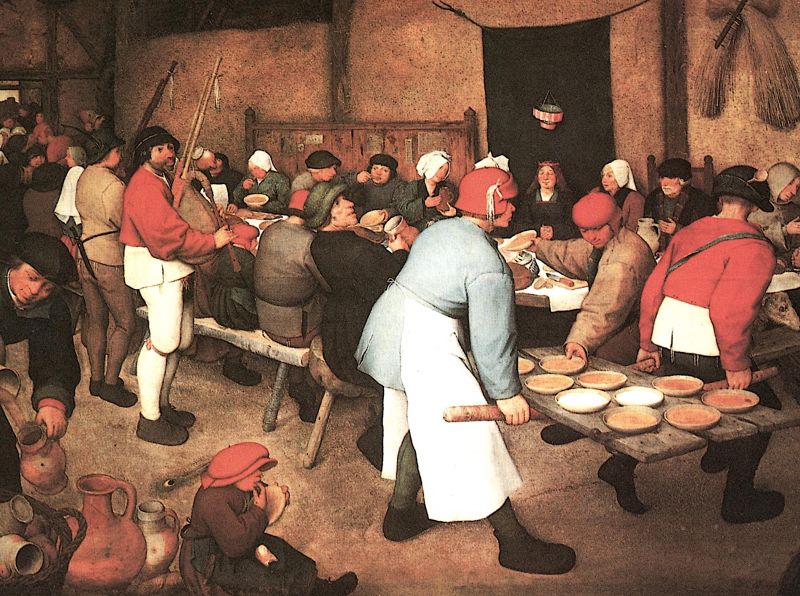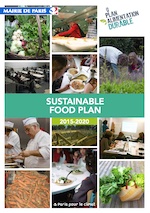In 2015, the City of Paris set itself the target of achieving 50% sustainable food in its 1,300 community restaurants by 2020, in the process improving the quality of the meals served while pursuing a range of environmental, economic and social objectives. So, how did it get on? In December 2020, it weighed up the successes it achieved and the lessons learned for the future.
The City of Paris has been implementing a sustainable food development policy since 2009. It considers food to be sustainable if it meets at least one of the two following criteria:
- It is produced through organic farming
- It is certified by the Label Rouge, the MSC (Marine Stewardship Council) label or the Sustainable Fishing label
The City of Paris has at its disposal a highly impressive municipal collective catering organisation: 30 million meals are served per year in 1,300 collective restaurants, including day care centres, school canteens, social reception centres, and city council employee canteens. With this in mind, on July 1, 2015, the Paris Council adopted the Sustainable Food Plan for the period 2015-2020, drawn up after a consultation phase, succeeding the first plan adopted in 2009.
Key targets
The Sustainable Food Plan set itself a number of key targets:
- Minimise the pressure on the environment (climate, biodiversity, water, soil and natural resources)
- Protect public health from the effects of synthetic chemical fertilizers and phytosanitary products
- Contribute to maintaining jobs in agriculture and reducing food dependency
- Reduce food inequalities by offering quality products to the most deprived
- Renew the bond of confidence between consumers and producers, and
- Deploy ambitious objectives for food processing
While the initial objective was to serve 50% sustainable food in the Paris contract catering sector by 2020, the Paris Sustainable Food Plan also met the targets set by the Paris Council for Contract Catering:
- A 20% reduction in meat products, with the introduction of one vegetarian meal per week
- No Genetically modified organisms (GMO), deep-sea fish from or products containing palm oil
- 100% eggs from free-range hens;
On the agricultural side, the main challenge was to develop and structure the organic sector for mass catering. 18 specific actions were divided into three areas:
- Consolidate and structure the demand for municipal contract catering through a sustainable purchasing policy
- Support the establishment of local sustainable channels for contract catering, with a better understanding of supply and demand
- Communicate, train and share insights, notably by encouraging feedback and focus groups
2019: a good year for sustaiinability
By 2019, food represented 53.1% of the food consumed by the collective catering sector, with organic taking a 46.2% in the total and 6.9% coming from Label Rouge, MSC and Pêche Durable.
The results in crèches in Paris were particularly impressive: 90.5% of dishes on offer contained sustainable food, 85% of which were organic. The latter were certified in 2017 by the Ecocert sustainable and organic food label En cuisine, which recognized:
- the large portion of organic and homemade food
- the use of ecological detergents
- the fight against over-packaging and food waste
- the highly respectable carbon footprint
In 2019, the quality of the food served in its crèches resulted in the City of Paris winning the “Victoires des cantines rebelles” (Victors of the Rebellious Canteens) award by the association Un Plus Bio.
Less food waste in school canteens
The Caisses des Écoles in each Parisian district, which are responsible for managing school catering in their resepctive areas, signed a “Food Waste Charter”. This charter enabled savings to offset the additional cost of organic food by serving portions more precisely adapted to the nutritional needs of children, or to offer fruit slices in place of whole fruit.
The 13 Caisses des Écoles, which together are responsible for 600 canteens, also adopted the Mon Restau Responsable (My Responisble Restaurant) approach, which aims to improve the quality of the menus served and reduce the carbon footprint in production processes.
Carbon footprint of menus falls 30%
Between 2011 and 2016 the carbon footprint of the food services business revealed a 7% decrease in greenhouse gas emissions, as a result of the introduction of the weekly vegetarian dish. The 9th and 10th arrondissements also conducted the Nos Cantines Engagées Pour le Climat experiment in collaboration with the research firm Eco2initiatives, which, thanks to the modification of foodstuffs, enabled a 30% reduction in the carbon footprint in the menus between 2018 and 2020.
Partnership to develop local sustainable industries
The City of Paris has formed a partnership to set up the Coop bio Île-de-France, which turns organic fruit and vegetables that are often unsuitable for mass catering into washed, peeled and ready-to-use products. The Coop now supplies Parisian crèches. In addition, the Caisse des écoles dof the 11th arrondissement entzered into an agreement with farmers, parimarily in the Vallée de la Vanne, to supply vegetables.
And the outlook for the next 5 years?
The City of Paris plans to implement a new Sustainable Food Plan for the period 2021-2026. with the aim of achieving 100% sustainable food, including 50% of local products.
This will also be accompanied by the AgriParis prefiguration structure, which will enable structuring of the agricultural sectors and supporting their transition to sustainable farming while guaranteeing the supply of quality and local food to canteens.
The objectives of the last 5 and future 5 years are part of a broader sustainable food policy, which includes a strategy up to 2030.
The Sustainable Food Plan 2015 – 2020
Click the image to find out more about the objectives and specific measures of the Sustainable Food Plan:


